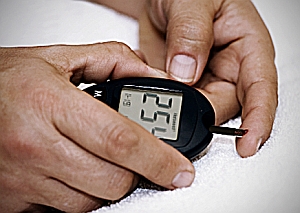The U.S. Food and Drug Administration approved on Friday the drug canagliflozin, taken in tablet form to improve control of blood glucose by adults with type 2 diabetes. Canagliflozin is marketed under the name Invokana by Janssen Pharmaceuticals Inc. in Raritan, New Jersey, a division of Johnson & Johnson.
Mary Parks, who directs FDA’s metabolism and endocrinology products division says, “Invokana is the first diabetes treatment approved in a new class of drugs known as sodium-glucose co-transporter 2 or SGLT2 inhibitors.” The drug works by blocking the reabsorption of glucose by the kidney, increasing glucose excretion, and lowering blood glucose levels in diabetics who have elevated blood glucose levels. Kidneys help balance blood glucose, by filtering glucose from the blood into the kidneys, then reabsorbing it back into the blood stream.
The drug is prescribed as part of a larger regimen of diet and exercise. Janssen says Invokana is also the only oral drug in the U.S. taken once a day that offers improved glycemic control while also showing in clinical trials that it helps reduce body weight and systolic blood pressure. FDA says the drug was tested in nine clinical trials involving a total of nearly 10,300 patients, both as a stand-alone drug and in combination with other therapies.
While results of the clinical trials show Invokana was generally well tolerated, side effects included genital fungal and urinary tract infections, increased urination, and dizziness or fainting when standing up, especially in the first three months of taking the drug. FDA is requiring Janssen to conduct post-market studies of cardiovascular outcomes, bone safety, and pediatric outcomes. The agency is also asking for increased monitoring for malignancies, serious cases of pancreatitis, severe hypersensitivity reactions, photosensitivity reactions, liver abnormalities, and adverse pregnancy outcomes.
Type 2 diabetes is the most common form of the disease, accounting for 90 to 95 percent of diabetes cases and affecting some 26 million people in the U.S. High blood sugar levels from diabetes can increase the risk for serious complications, including heart disease, blindness, and nerve and kidney damage.
Read more:
- Grant to Fund Glucose-Sensitive Insulin Development
- Asthma Drug Reveals Potential as Diabetes, Obesity Treatment
- Clinical Trial to Evaluate Type 2 Diabetes Treatments
- Nanotech Sensor Detects Glucose for Diabetes Testing
- New Methods Found to Better Monitor Glucose, Control Insulin
* * *


 RSS - Posts
RSS - Posts
You must be logged in to post a comment.